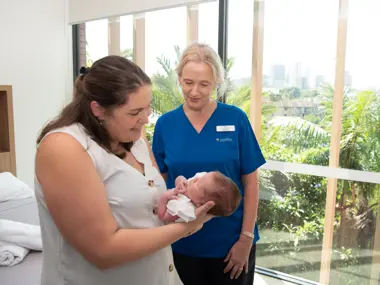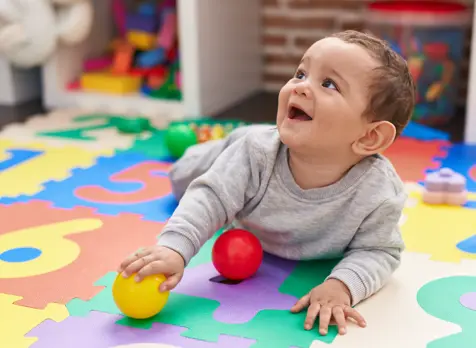Baby Awake Windows & Routines 3 to 5 Months

Feeding, playing and sleeping are the three main activities in your 3 to 5 month old's routine. Try to do them in the same sequence at the same time each day.
It's ok to make changes based on your baby's tired signs. The most important part of establishing awake windows and routines is to be led by your baby's cues and tired signs.
Some days will go smoothly, but life happens, and disruptions like illness and busy days may impact your baby’s daily routine and awake windows, and that is ok.
When you feel back on track, move back to your regular routine as soon as possible.
Example: 3 to 5 Month Awake Windows and Routines
-
1
FEED Early morning (after 5am) milk feed. May return to sleep OR get up to start the day.
SLEEP Respond to your baby's tired cues.
-
2
FEED Mid morning milk feed.
PLAY Average awake time is 1.5 - 3 hours. This includes the time taken to feed and play.
SLEEP Respond to your baby's tired cues.
-
3
FEED Lunchtime milk feed.
PLAY Average awake time is 1.5 - 3 hours. This includes the time taken to feed and play.
SLEEP Repond to your baby's tired cues.
-
4
FEED Mid afternoon milk feed.
PLAY Average awake time is 1.5 - 3 hours. This includes the time taken to feed and play.
SLEEP Respond to your baby's tired cues. They may only need a short nap.
-
5
FEED Evening milk feed.
QUIET TIME Bath, then a cuddle ready for bed.
SLEEP Settle for the night. Your baby will still wake for feeds overnight.
A 3 to 5 Month old Baby Sleep Routine
As your baby matures, wake times during the day increase, and night sleeps lengthen. Some babies will have 2 -3 longer sleeps per day, while others only need short sleeps.
Every baby is different, and as you get to know your baby, you will begin to understand their tired signs. Tired signs can include:
- Drowsiness
- Dull eyes and heavy lids
- Quiet or less alert
- Yawning
- Sucking or putting hands to mouth
- Fussy or restless
- Rubbing eyes, face, and ears
When considering if your baby is ready for sleep, consider how long ago their last feed and sleep was. If your baby is happy and interactive during wake times, it's likely they had enough sleep.
As your baby gets older, they may still wake overnight but may not always need a feed. They might need you to help them learn how to join sleep cycles without a feed straight away or be practising a new skill they have learnt (like how to socialise or rollover) or need connection time with you.
Night waking is still normal at this age, and babies are not expected to sleep through the night for long periods until after 6 months. All babies develop differently, and most babies will still wake for a feed over night until 12 months.
A 3 to 5 Month old Baby Feeding
By now, feeding is usually well established, and your baby is likely to be feeding every 3 to 5 hours, including at least 1-2 milk feeds overnight.
View our pages for breastfeeding 4 to 5 month old baby or 0 to 12 month old bottle feeding for more information.
A 3 to 5 Month old Baby Playtime
There are many ways to build a relationship with your baby during awake windows, and playtime is an excellent one. Here are some ideas:
- supervised tummy time (floor play)
- rattles and soft toys to encourage interaction
- reading stories to your baby using soft books
- take your baby for a walk in the pram
- play hand games such as ‘ring a rosy’
- sing songs or play music
Your baby will communicate with your non-verbally during playtime. To tell you your baby is ready to play, they might:
- Lift their head and face to you
- Gaze straight into your eyes
- Reach to you with their arm
- Smile
- Look alert
Your baby might need a break from playtime when they:
- Frown
- Look away
- Pull their ears or rub their head
- Arch their back
- Flap arms
- Fuss or cry









































